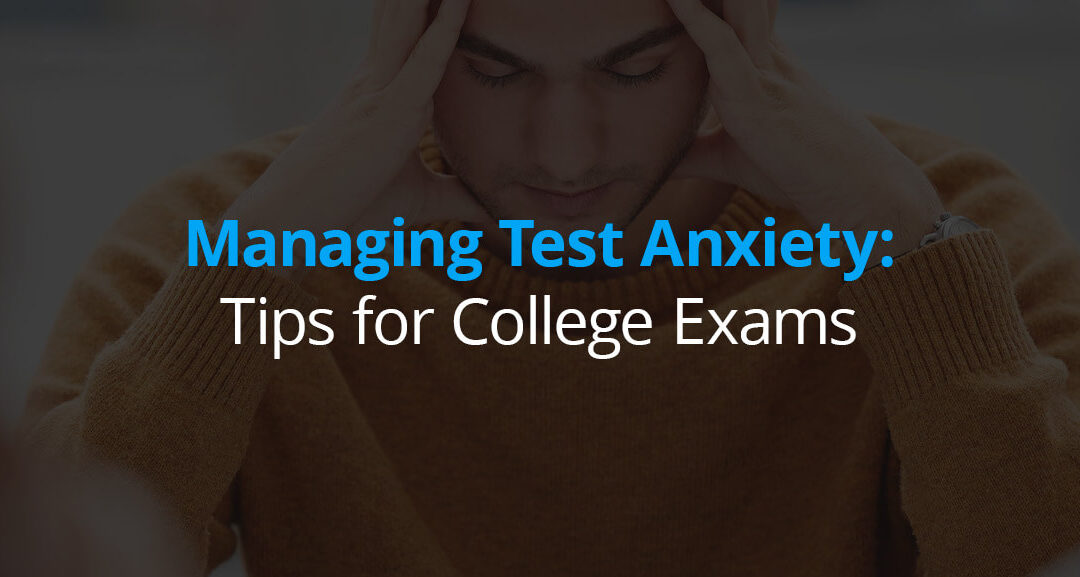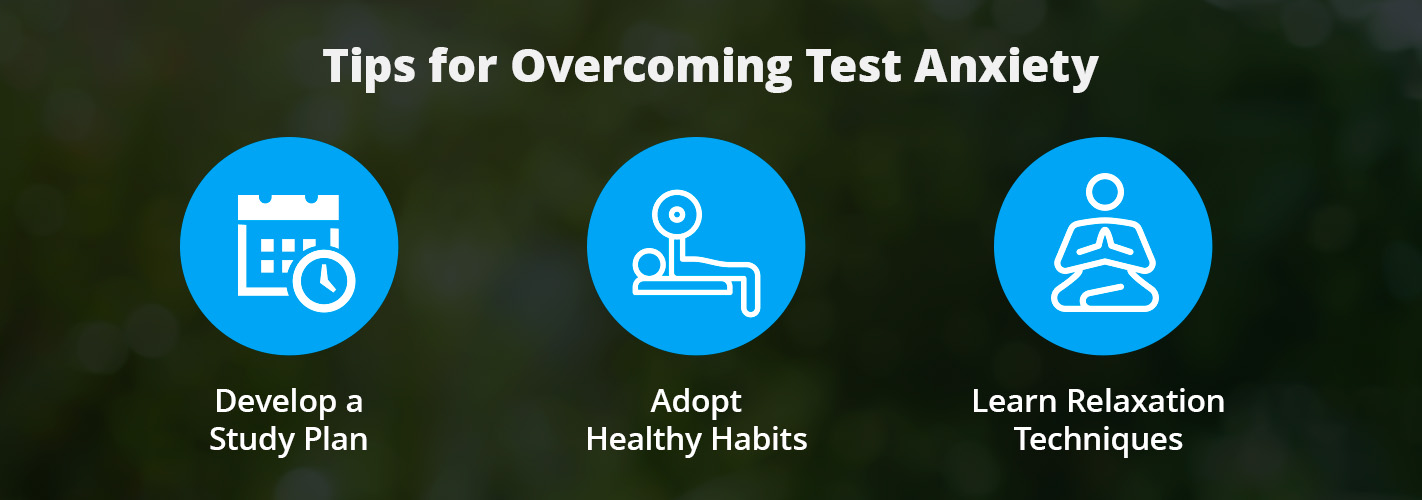The first thing to know about test anxiety is it’s very normal — so if you or your loved one experience it, you’re not alone. Between 25% and 40% of students in the United States experience test anxiety and know how frustrating it feels. Luckily, there are many coping skills for test anxiety, and in this article, we’re going to look at a few of those.
What Exactly Is Test Anxiety?
Test anxiety is the anxiety you may experience in a situation where you feel pressured to perform. You may feel excessive stress, worry and fear, and your performance may be impacted as a result. For example, if you have test anxiety, you may score lower on an exam even when you’ve studied and feel confident that you understand the material.
When you understand and can identify the signs of text anxiety, you can take the first step toward managing it. These are some common test anxiety symptoms, but yours may be a little different:
- Physical symptoms: You might break out into a sweat and feel nauseous every time you think about the test. Other physical symptoms may include dizziness and headaches, and some individuals may feel fidgety or bite their nails.
- Emotional symptoms: When you get anxious before a test, you might experience a wave of emotions like dread or frustration.
- Cognitive symptoms: During the exam, you might forget what you studied, leading to negative self-talk and racing thoughts. When you’re studying, you might read paragraphs and then realize you didn’t understand or absorb anything.
Causes of Test Anxiety
Several possible underlying causes could be at the root of your test anxiety. Here are some examples:
- Fear of failure: Do you have high expectations of yourself or feel like someone close to you has high expectations of you? This can intensify the fear of not performing well.
- Lack of preparation: Procrastinating or not knowing how to study effectively can also lead to anxiety. In this case, you can reach out to a school counselor or a professor for tips. Study groups are also a good place to start because they give you the opportunity to learn from your peers and see how they study.
To identify the cause of your test anxiety, you can absolutely talk to a professional. Test anxiety therapy can help you identify the core of the issue, which may help alleviate your symptoms and enable you to find effective test anxiety strategies.
Tips for Overcoming Test Anxiety
In this section, we’ll learn how to overcome test anxiety with a few test anxiety tips for college students.
1. Develop a Study Plan
Starting your study preparation early is one of the best ways to combat test anxiety. It can help lift some stress off your shoulders by giving you plenty of time to work through the subject matter. As you study, organize the material into easy, manageable sections that you can process. For example, if your exam covers four chapters, you can study one chapter per day rather than try to cram all of your studies into one night.
You’ll also want to be realistic about your study schedule. Telling yourself you’ll study for three hours every night during the three weeks leading up to the test may not be feasible. Even if you do manage to study for three hours one day, you might not do so the next day. Instead, you could try committing to 45 minutes of studying a couple of days per week in the two weeks leading up to the exam.
Getting started early also gives you a nice buffer, so if there’s anything you don’t understand, you can reach out to your professor or a peer mentor before the exam. If you understand everything right away, you can use the buffer time to go through each section again.
There are a number of effective study techniques that you can use to support yourself. For example, you can join a study group to stay on track. You could also try summarizing large amounts of information into bullet points to capture what’s most important. Another useful tip is to go through the information and then try and teach it to another person. If you don’t have a person around, do a presentation on the subject in front of a mirror.
2. Adopt Healthy Habits
Another way to deal with test anxiety in college is to develop healthy habits that will keep your energy levels consistent. While figuring out your meals isn’t easy in college, try to get a mix of all the different food groups and maintain a healthy diet. A high-sugar diet or high levels of starch can affect your energy levels by either dropping them or causing them to crash.
Getting regular exercise is also important. Regular activity causes the release of natural mood-elevating hormones and reduces your stress levels. Exercise will also help you stay focused and increase your concentration levels. And, of course, getting good sleep is essential. We know it’s hard in college, but it should be a priority. You’ve heard it before, but staying off of the electronics and minimizing caffeine intake can both help.
3. Learn Relaxation Techniques
Once you identify that you are experiencing anxiety, the next step is to take action with relaxation techniques for test anxiety. While sitting at your desk, practice deep breathing to calm your nervous system and reduce your physical symptoms. Remember, a lot of anxiety symptoms are there because your body, oddly enough, wants to help you. Positive stress can keep you alert and motivated.
However, feeling too much stress during a test can override those positive effects, and it’s often better to feel relaxed than hyped up. When you feel the anxiety symptoms coming on, try a technique called Progressive Muscle Relaxation (PMR). This involves focusing on a set of muscles, tensing them and then releasing them with an exhalation. You can start at the bottom of your body and move up through your body’s different sections, like feet, legs and torso.
You can also try to visualize yourself in a calm space that is personal to you. This will take your mind off the current situation and put you somewhere you feel comfortable. For example, maybe you felt relaxed floating in a pool last summer. Or maybe a lazy Sunday afternoon in bed is coming to mind. Once your mind feels relaxed, you can begin the exam.
Seek Support From Merrimack Valley Psychological Associates
Therapy offers an opportunity to release all your concerns and focus on your needs under the guidance of a professional. Merrimack Valley Psychological Associates is here to support you and help you work through any anxieties you may have about exams. We proudly offer comprehensive stress management services, and we cater our counseling plans to your unique needs because we understand each person is different.
Schedule an appointment with Merrimack Valley Psychological Associates to discuss stress and test anxiety today.



